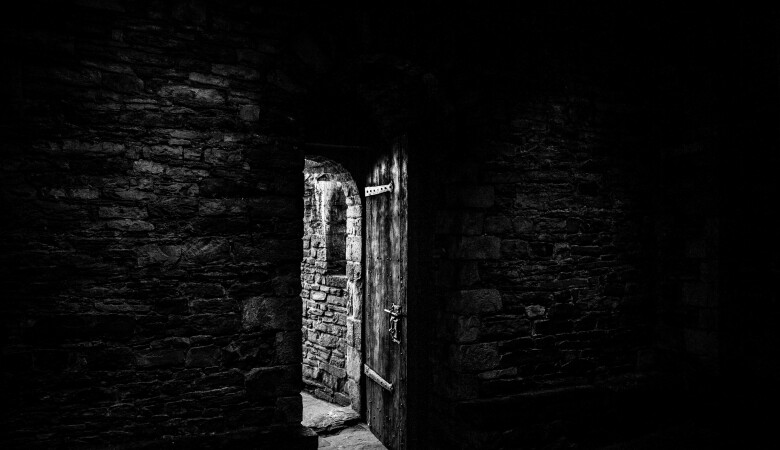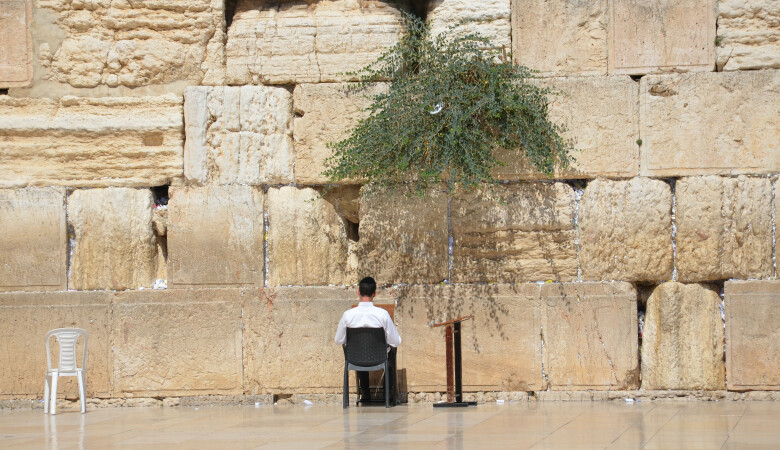Series: Mark
The Mount of Transfiguration: A Preview of Christ’s Glory (Mark Sermon 42)
February 19, 2023 | Andy Davis
Mark 9:1-8
Deity of Christ, Majesty of God
Jesus' transfiguration into heavenly glory on the mountain and his conversation with Moses and Elijah was spectacular display of His true divine nature.
- SERMON TRANSCRIPT -
Turn in your Bibles as we continue our study in this magnificent gospel, Mark's Gospel. We turn now to the ninth chapter, Mark 9:1-8. This morning in the text we are invited up into a mountaintop experience. We are invited up into a display of the glory of God in the face of Christ. We are invited up into a bright cloud, enveloping cloud, of Almighty God, speaking of his love for his only-begotten son. As we do so by faith, we are looking back at a moment in time when for a brief instant, the veil of the incarnation was pulled back and Jesus's true glory shown forth. But also by faith we look ahead to not just a mere moment, but an eternity of walking in Christ's glory in the new heavens and the new earth. When the new Jerusalem will not need the light of the sun or the light of the moon or the light of a lamp, for the glory of God will give it light and the lamb, Jesus, will be the lamp.
We need this mountaintop experience, don't we? We need it. We need this display of Christ's light. We need the experience of the bright cloud of God's glory and his mighty voice declaring his love for his son. We need this because of this present darkness that we are all walking in. This present darkness, that's Paul's phrase in Ephesians 6, battling disease, battling injury, battling aging, battling pain and anxiety and fear and guilt and sorrow, battling Satan and demons and their temptations, most of all, battling sin. We need this mountaintop experience, don't we? The Lord in his graciousness and his kindness has given it to us in Mark 9:1-8. We need it, and I think the disciples needed it too.
I. The Context: A Needed Preview of Christ’s Coming Glory
The context of the Mount of Transfiguration account, as we've seen, is what's been happening in Mark's Gospel. Jesus is on retreat with his apostles in Caesarea of Philippi, as they were moving along in that area. He asked them concerning his own identity, who do people say that I am, and they gave the answer. And then that most important question that we would ever face, that any of us ever faces, the question on which our own eternal destiny hangs our answer to that question, what about you, who do you say that I am? Simon Peter speaking for all of the apostles, speaking for indeed all believers at all time, gives in Matthew 16 the full confession, "You are the Christ, the son of the living God." But then Jesus went on to give a stunning, a shocking revelation of his own imminent death[Mark 8:31- 32]. He then began to teach them that the Son of Man must suffer many things and be rejected by the elders, chief priest and teacher of the law, and that he must be killed, and after three days rise again. He spoke plainly about this.
Peter, again, probably speaking for all of them, took Jesus aside privately and rebuked him. Matthew tells us, he said, "Never, Lord. This shall never happen to you." But then Jesus turned and publicly rebuked Peter in front of all of them. "Get behind me, Satan," He said. “You do not have in mind the things of God, but the things of men.” The kingdom of God would be built by Christ's suffering and death, by his bloodshed on the cross. And not only that, it would be advanced and built across generations of his servants who are similarly willing to suffer and to die in his name[Mark 8:34-38]. He called the crowd to him along with his disciples and said, "If anyone would come after me, he must deny himself and take up his cross and follow me. For whoever wants to save his life will lose it. But whoever loses his life from me and for the gospel will save it. What good would it be for a man to gain the whole world and forfeit his soul? What could a man give an exchange for his soul? If anyone is ashamed of me and of my words in this adulterous and sinful generation, of him will the son of man be ashamed when he comes in his father's glory with his holy angels.”
I think the apostles must have been reeling at this. These are heavy words. We've walked through them over the last number of sermons and felt the weight of it. I think they would've agreed with Peter about Jesus the Messiah, the Son of David suffering and dying on a Roman cross. To them, the Kingdom of God must be glorious, powerful, dominant, would fill the world with the glory of God, and the Romans would melt like wax before it, before the coming kingdom. How could it possibly be that the Messiah, the Son of David, would die, especially if he's not merely human, but is actually in fact the son of the living God? How could that be? To them at that moment, it made no sense whatsoever.
Now, of course, they didn't realize that the real threat facing them was not Roman power or any Gentile power. The real threat facing every sinner is the wrath, the just wrath and condemnation of a Holy God on Judgment Day. That's the danger. A Holy God whose laws they and us, all of us, have violated throughout our whole lives. A God who could by no means clear the guilty without blood sacrifice. Now, Jesus knew their hearts were stunned, crushed, reeling, unable to wrap their minds around this infinite contradiction, a personage so obviously powerful, able to still a storm with his words, able to walk on the sea, able to drive out a legion of demons with a word, able to heal any, every disease and sickness effortlessly and completely and instantly, able to make bread and fish appear out of thin air, feed a multitude. How could such a powerful and perfect man be arrested like a common criminal, suffer rejection and torture, and then be crucified and die? He knew they were reeling, and He knew what they needed. For a brief moment He would allow their faith to become sight. He would reverse the basic rule of the incarnation, that He had left the form of his glory as God behind in the incarnation. He would let them look on his true glorious nature for just a moment to restore their faith in his ultimate triumph as king of the Kingdom of God.
"For a brief moment, He would allow their faith to become sight.… He would let them look on his true glorious nature for just a moment to restore their faith in his ultimate triumph as king of the Kingdom of God."
He makes a promise to them. Look at verse 1. He said to them, "I tell you the truth, some who are standing here will not taste death before they see the Kingdom of God come with power." Now, there are many theories on what this statement means, lots of back and forth. But I have to tell you, all three of the synoptic gospels, Matthew, Mark, and Luke, immediately follow this statement with the Mount of Transfiguration, all three of them. I don't think we should wonder what He meant. I believe that experience by Peter, James, and John was a direct fulfillment of this promise. They did not taste death before they saw the Kingdom of God come with power, before they would behold his glory.
The phrase “they would see the Kingdom of God come with power is very provocative for Jesus's heavenly glory to be revealed briefly as a preview, a foresight rather than foretaste, we could say, of his kingly power. Jesus' full Second Coming glory will be powerful even to the destruction of all of his wicked enemies. He's going to come in the clouds with power and great glory. Jesus just said in Mark 8:38, "The Son of Man will come in his father's glory with the holy angels." Jesus knew his disciples needed this foresight of his kingdom's immeasurable power and glory, and they wouldn't have to wait long.
II. The Earthly Eyewitness of Christ’s Majesty
Six days later, it came, the earthly eyewitnesses of Christ's majesty. Look at verse 2, “After six days, Jesus took Peter, James, and John with him and led them up a high mountain where they were all alone.” Why only three and why these three? Well, first of all, they were the inner circle. The twelve were selected of a mass of disciples, followers of Jesus, to be apostles and they had a special role. And then within the twelve, there was the three that were the inner circle, Peter, James, and John. These would be the same ones who would be with him in his hour of distress in Gethsemane. They were his closest friends on earth. The number 3, I think, is significant because that is the number of witnesses needed to fully establish any matter in Jewish law. As Paul wrote in 2 Corinthians 13:1, every matter must be established by the testimony of two or three witnesses. These three would officially testify to what they would see to the other apostles and then eventually to the whole world, meaning us this morning. We would have the eyewitness account of this experience through these three. We would know it's true. Now, years later, the Apostle Peter would write about this experience. I'd like to actually invite you to turn to 2 Peter 1:16-18. It is very powerful. Peter writing about what it was like for him to see this. 2 Peter 1:16-18, there Peter writes, “We did not follow cleverly invented stories when we told you about the power and coming of our Lord Jesus Christ, but we were eyewitnesses of his majesty. For he received honor and glory from God the Father, when the voice came to him from the majestic glory saying, ‘This is my Son whom I love. With him I am well pleased.’ We ourselves heard this voice that came from heaven when we were with him on the sacred mountain.” He's definitely talking about this experience, the Mount of Transfiguration.
Peter says, the gospel accounts of the life of Jesus were not cleverly invented myths. They were based on actual history and actual history itself is based on eyewitness testimonies. Peter says, "We were eyewitnesses of his majesty when he was revealed with divine glory on the sacred mountain and by the voice of Almighty God," as we see in our account in Mark. Peter says, "We ourselves heard this voice." As he says, "We ourselves saw his glory as witnesses." Now, if you were to continue in 2 Peter 1, he says, "We have the word of the prophets made more certain, and you will do well to pay attention to it as to a light shining in a dark place."
That's how I began the sermon. Many of you would say, "Boy, I wish I had been there. I wish I could have been there to see the transfiguration. What an incredible mountaintop experience that would be." Peter says it's actually better to read scripture than to have been there. The word of the prophets is more certain than the experience. Why is that? Experience is over, and then what, right? What happened last week? Do you remember? That was amazing. Well, I think that was this, and no, it was that. I'm pretty sure it was the... Look, Peter says, the word of the prophets is perfect, it's unchanging, and it's more certain than any experience we could ever have.
The best experience you could ever have of the glory of God is to read the prophetic word. That's what Peter's saying. But he's saying it did happen. It did happen. And guess what? Now this experience is in the prophetic word and we get to read it for all time. The Apostle John, I think, refers to it not so clearly talking about the Mount of Transfiguration, but just his experience of Jesus' life as a whole. John writes in his epistle 1 John 1:1, he says, "That which was from the beginning, which we have heard, which we have seen with our eyes, which we have looked at and our hands have touched, this we proclaim concerning the word of life. We were eyewitnesses."
That's why he brought Peter, James, and John up there. Go back to Mark 9. The point of all of this, the point of all four Gospels we say, week after week, is to bring you and I, the readers of the gospel, with Matthew, Mark, Luke, and John, to confess Jesus as God. None of the gospels says it better than John 20:31, “These are written that you may believe that Jesus is the Christ, the Son of the living God, and believing may have life in his name.” All of the four gospel accounts are written to bring you to faith in Jesus as God.
III. Jesus Transfigured Before Them
This account of the Transfiguration is overwhelming evidence of his deity. Peter, James, and John were led up by Jesus up a high mountain where they're all alone. Luke tells us in his account of the Mount of Transfiguration, they went up to pray, and so they did. They were up there praying. Jesus loved to do this. He loved to go up on mountains and pray, usually alone. But in this case, He takes these three friends with him. There's something about the mountaintop experience, isn't there? Just getting up elevated. I'm definitely a mountain person. I just love getting up high and be able to look down over the valleys below. There is that sense of being up. We don't know for certain what mountain they're on. But because of the proximity to the Caesarea of Philippi, most scholars believe it was Mount Hermon, which is quite a mountain. It's 9,232 feet above sea level. It's a dramatic vista of that whole region, and so it was this mountaintop experience. Then Jesus was transfigured before them. Look at verse 2 and 3. There He was transfigured before them. His clothes became dazzling white, whiter than anyone in the world could bleach them. It's a stunning transformation in the appearance of Jesus and his clothing.
Essential to the theology of the incarnation was that Jesus appeared ordinary. That's essential to our salvation. It's essential to the salvation that, God works through Jesus, and He had to appear ordinary. This was predicted in Isaiah's great prophecy of him in Isaiah 53:2, “He had no beauty or majesty to attract us to him. Nothing in his appearance that we should desire him. He was despised and rejected.” This ordinary appearance was essential to him being known only by faith, not by sight. You had to be able to see him properly by faith, not by sight. It had to be revealed by the Father who Jesus was or you're not going to get it, because He just looks like a mere man and He's claiming to be God. If Jesus is radiantly glorious all the time, everybody's on their face around him. That's the inevitable reaction. As a matter of fact, in John's gospel, when his enemies came to arrest him, He asked, "Who are you looking for?" They said, "Jesus of Nazareth." Jesus said, "I Am," and they drew back and fell to the ground. The full display of the glory of Jesus did not fit with the plan of God that Jesus would be despised and rejected, ultimately leading to his crucifixion. They would never have crucified, Paul says in Corinthians, the Lord of glory if He'd appeared glorious.
"It's essential to the salvation that, God works through Jesus, and He had to appear ordinary."
But for just this one moment, the rules of engagement were changed, just for a moment. A radiant light, [Matthew 17:2], his face shown like the sun and his clothes became as white as the light. His face is shining. There's overpowering light coming directly from his face, so also his clothing. Luke 9:29 says, "As he was praying, the appearance of his face changed." Listen to this. "His clothes became as bright as a flash of lightning." You could imagine, have you ever looked at and seen a flash of lightning? It's just overpoweringly bright. His clothes are shimmering, like light flashing, like a jewel in their heavenly brilliant white, a symbol of perfect radiant purity. “God is light and in him there's no darkness at all.” [1 John 1:5] Light is strongly connected with the presence of Almighty God in many places, but also Psalm 104:2, “He wraps himself with light as with a garment.” It's beautiful, isn't it? It lines up with the Mount of Transfiguration. Before Jesus was incarnate, He was glorious. Before Jesus was incarnate, He was glorious. As a matter of fact, in John 17:5, He prays to get his glory back, “And now, Father, glorify me with the glory I had with you before the world began.”
Jesus shared a glory that God says in other places He will not share with another. There's a unique glory that God has that He shares with his Son, because his Son is God. We can see that in the prophets. Isaiah and Ezekiel had visions of pre-incarnate Christ and his radiant glory. Isaiah 6, “ In the year that King Uzziah died, I saw the Lord seated on a throne high and exalted and the train of his robe filled the temple. Above him there were seraphs, each with six wings. And with two wings they covered their faces, and with two wings they covered their feet, and with two wings they were flying. They were crying to one another, ‘Holy, holy, holy is the Lord Almighty. The whole earth is full of his glory.’" John tells us in John 12:41 that Isaiah saw Jesus' glory and wrote about him. That was Jesus' glory.
Ezekiel has a vision, I think, also of the pre-incarnate Christ. In Ezekiel 1 the prophet had a vision of cherubim who moved back and forth and there's wheels within wheels. The cherubim themselves were brilliant as lightning and flashes of lightning were moving continually back and forth among the cherubim. Fire was moving back and forth among them, as though fire is their native habitat. Then high above them is an expanse sparkling like ice and awesome, and high above that expanse over their heads was what looked like a throne of sapphire, and high above that on a throne was a figure like that of a man. I saw that from what appeared to be his waist up, he looked like glowing metal as if full of fire. And that from there down, he looked like fire and brilliant lights surrounded him. Like the appearance of a rainbow in the clouds on a rainy day, so is the radiance around him. This was the appearance of the likeness of the glory of the Lord. “When I saw it, I fell face down.” Ezekiel's reaction is common for all who have encounters with the glory of God in the Bible. They're always overwhelmed and knocked to the ground. That's why Jesus couldn't do this all the time. These passages give us a sense of the infinite glory that was Jesus before the world began and before He was incarnate.
Paul makes it plain, that essential to his incarnation was Jesus' humility in laying aside the form of God, laying aside the outward appearance of majesty and glory that is his by right. In Philippians 2:6-8, “Jesus, though he was in the form of God, did not consider equality with God something to be grasped, but made himself nothing, taking the form of a servant. Being born in likeness of men and being found in human form, he humbled himself by becoming obedient to death, even death on a cross.” The Greek word form there is “morphe”. It has to do here with his appearance and presentation to onlookers. The radiant light, the magic, majestic glory that belongs to God alone was Jesus' by right since he is equal in deity to the Father. He laid aside the “morphe”, the “form”, the appearance of God, and took on the “morphe”, the form, the appearance of a human being and a servant. Charles Wesley in his Christmas hymn, Hark the Herald Angels Sing, “mild he lays his glory by, born that man no more may die.” He lays his glory aside.
This transfiguration now, this is a metamorphosis. That's the Greek word, Jesus' “morphe,” his form, his appearance, his likeness changed, not his essential nature. He always was God, is God now, and forever will be God. The entire universe depends on the deity of Christ. He can't stop being God and then start being God. That's not what the incarnation was all about. He was God, is God, will forever be God. He's the same yesterday, today, and forever. But his “morphe”, his form, had changed. And like I said, in the incarnation, usually He looked completely ordinary, until this one moment. He allowed some of his divine glory, a glory that is his by right, to be shown to these three witnesses, Peter, James, and John. The Greek word is “metamorphoo”, “metamorphosis”, that's where we get it. It's like a change of appearance. But interestingly in the Greek, it's in the passive voice. He was metamorphosized. It was done to him. He didn't do it to himself. God did it to Jesus. God the Father wanted Jesus to appear glorious to Peter, James, and John. This transfiguration happened right before their eyes. Indeed, it was the whole point. The light was not for Jesus's benefit, it was for theirs and for ours, to prop up their flagging confidence in the light of his revelation, that He would suffer and die.
IV. The Heavenly Eyewitness of Christ’s Exodus
The heavenly eyewitnesses of Christ's exodus, now we've got... If it's not exciting enough, now it gets even more exciting. Look at verse 4. There appeared before them Elijah and Moses who are talking with Jesus. Now, this is amazing. Two deceased heroes of Israel's past show up talking with Jesus. We believe that they were among the spirits of the righteous made perfect, that the author of Hebrews speaks about in Hebrews 12, that were surrounding God's throne in the Heavenly Zion. They're in the spirit realm. They were absent from the body, present with the Lord. Moses, the great lawgiver, the author of their first five books of the Bible, the leader of the exodus from slavery in Egypt, Moses, and then Elijah, the greatest of the prophets who ascended to heaven in a chariot of fire, talking with Jesus. Many scholars have said they represent the law and the prophets in their testimony to Jesus. I think they were actually there, but I think that's valid, that the law and the prophets testify to Jesus. This also proves in Jesus's pattern, the resurrection from the dead. Remember how the Sadducees said that there is no resurrection from the dead? Jesus says about the resurrection of the dead, "Have you not read what God said to you? I am the God of Abraham and the God of Isaac and the God of Jacob." He is not the God of the dead but of the living. In other words, “I am Abraham's God right now. Abraham continues to exist. I am Isaac's God right now. He continues to exist and have a relationship with God. I am Jacob's God." Let's add these two. “I am Moses' God. He continues to exist. I am Elijah's God. He continues to exist.”
For this brief encounter, they appeared to have human bodies, I guess. I don't know how they knew that it was Moses and Elijah. I doubt they were wearing name tags. You know how you just know things in a dream or maybe they heard the conversation? But they knew it was Moses and Elijah talking with Jesus. What was the topic of their conversation? Mark doesn't tell us, but Luke does. In Luke 9:30-31, it says, "Two men, Moses and Elijah, appeared in gloria splendor talking with Jesus." Listen to this. "They spoke about his departure, which He was about to bring to fulfillment in Jerusalem." All right, simple terms, they're at least talking about his death. What was his departure that He was going to bring to fulfillment in Jerusalem but his death?
Why would that be the topic? That's the very thing that Peter, James, and John and the rest of them are reeling over. It's the very thing they're going to talk about going down the mountain. This is the point of all this is that they would understand how essential Jesus' death is to God's glorious plan. But even cooler than that is that the Greek word for departure is “exodus”. Basically Moses is saying, "I just did the symbolic exodus." Yes, it was physical and all that, but the real exodus is done by Jesus, because the real slavery is sin. As He says in John 8, “Anyone who sins is a slave to sin. But if the Son sets you free, you'll be free indeed.”
What is that exodus? It's Jesus' work in us setting us free from our sin. That's what they were talking about, the exodus that Jesus would bring to fulfillment in Jerusalem by his death. At this moment, Peter thought it best to say something. Don't you love Peter? Isn't he a piece of work? Peter said to Jesus, "Rabbi, it is good for us to be here. Let us put at three shelters, one for you, one for Moses, one for Elijah." He did not know what to say. They were so frightened. Just a glimpse into Peter's personality. I've said this before, but now is the moment to say it for the record. There are two kinds of people, those who when they don't know what to say, say something, and those who when they don't know what to say, say nothing. Peter was in the first category. I don't know what to say, but let's just roll this out. Honestly, Peter's words were foolish. There's not a time for him to talk. Furthermore, there's a nefarious kind of center to it. I think they wanted to stay in the mountaintop experience. We know that they have to go down off that mountain, down into the valley, and what's going to happen down there is going to be really hard. There's going to be some immediate ministry that's going to be very distressing, and then the road is leading to Jerusalem and to his death. Peter doesn't want any part of that still. He just wants to stay up there on the mountaintop experience. Furthermore, he wants to make three shelters as though Moses, Elijah, and Jesus are all equals.
Finally, as though this isn't dramatic enough, a bright cloud appears. This literally brings goosebumps to me even right now. God the Father shows up and surrounds them in a bright cloud, a bright cloud envelops them [Matthew 17:5]. God often appeared in the Old Testament in a bright cloud. Now, this is not a normal cloud that reflects sunlight. This is a cloud that has its own brightness. It is a cloud of light. It enveloped them, It surrounded them in cloud and light, and then the voice of Almighty God came from that cloud. "This is my Son whom I love. With him I am well pleased. Listen to him.” This is the second time that God has said these words. At Jesus' baptism, in Mark's gospel, He says them to Jesus. "You are my Son whom I love. With you I'm well pleased." Here, He says them to Peter and the other two apostles, "This is my son whom I love. With him I am well pleased." Here we are, as I said at the beginning of the sermon, invited up into the bright cloud of Almighty God's love for his Son. He's inviting you in. He wants you to know how much He loves his Son. “For the Son is,” [Hebrews 1:3], “the radiance of God's glory and the exact representation of his being.”
One of the most important lessons you can ever learn about God is that God is happy. He is a blessed being. He is in and of himself a happy, full, complete being. He sits on a throne and does whatever pleases him. At the core of his pleasure is his love in his Son. John Piper in his book, The Pleasures of God, said this, "A great part of God's glory is his happiness. It is a glorious thing for God to be as happy as he is. God's glory consists much in the fact that he is happy beyond our wildest imagination.” Piper goes on to argue that the happiness of God is first and foremost a happiness in his only begotten son. From eternity past, God the Father has effectively stared into the face of his Son, his only begotten Son, and has delighted in it. He is infinitely well pleased with Jesus, and our salvation very much consists in being able to enter into that joy, that happiness, that indescribable love forever. What an incredible thought. God the Father wants us to share in the love He has for his Son. Jesus said, "As the Father has loved me, so have I loved you. Now abide in my love." It's like being in that cloud forever. Stay in that love.
"One of the most important lessons you can ever learn about God is that God is happy."
Now, beautifully, He's going to transform us to make us as morally and physically beautiful and perfect as Jesus is. Thank God for that. We're going to shine like the Son in the Kingdom of our Father, but He's going to transform us. The key to all of that, that salvation, is we need to listen to Jesus talk to us. It's by listening, by hearing, that we are going to be transformed. Faith comes from hearing, and the hearing is the message of Christ. Or again, in John 10:27-28, "My sheep listened to my voice. I know them and they follow me. I give them eternal life."
V. Let All Mortal Flesh Keep Silence
God says and it feels like a rebuke to Peter a little bit, listen to him. What I get out of that is “Peter, be quiet. Be quiet. It's not by your talking that you're going to be saved. It is by me talking to you. It is by Jesus talking to you. It is by the word of God that you are saved.” Psalm 46:10, "Be still and know that I am God," or as Habakkuk 2:20 says, "The Lord is in his holy temple. Let all the earth be silent before him." I feel like this voice from the cloud is speaking to the entire human race across every century. “All of you, be quiet and listen to my Son. I love him. He is my glory. Listen to him and you will be saved.” As the ancient hymn writer put it, “Let all mortal flesh keep silent and with fear and trembling stand; ponder nothing earthly-minded, for with blessing in his hand, Christ, our God, to earth descendeth, our homage to demand.” By listening to God, we have faith in Christ, and by faith in Christ are our sins forgiven.
Suddenly, Jesus only. Look at verse 8. Suddenly, when they looked around, they no longer saw anyone with them except Jesus. The bright cloud is gone, Moses and Elijah are gone. It's only Jesus, only Jesus. Moses and Elijah are not equal with Jesus. Not at all. The bright cloud from which God spoke was not needed either, because Philip said, "Show us the Father and that will be enough.” He said, "Don't you know me, Philip? Anyone who has seen me has seen the Father." You don't need the bright cloud. Look at Jesus and you'll see the Father's glory. Christ alone is sufficient. He is, in fact, the final word that God speaks to the human race, as Hebrews 1:1-2 says., “In the past, God spoke to our forefathers through the prophets at many times and in various ways. But in these last days, he has spoken to us by his Son.” The Son is a radiance of God's glory.
VI. Lessons
First of all, the infinite glory of Jesus. Not one of us fully realizes how great is Christ's glory. Not one of us sees him properly. All of us should yearn for a clearer vision of Christ, of his power and his glory. And that comes by listening to Christ's word, by listening to his words. All of us should realize the delight the Father has in Christ. This Jesus is the Savior of the world, so trust in him, all of you. I don't know your spiritual condition. I don't know what state you are in when you came in here today, but all you have to do is believe in Jesus as the glory of God, believe that He was incarnate by the power of the Holy Spirit, that He lived an ordinary physical life, though He was God, that He died in your place on the cross, a bloody death that you deserve, but He died in your place so that your sins could be forgiven.
All you have to do is trust in him and they'll all be forgiven, and you'll have a promise of seeing His glory for all eternity. Therefore, learn to listen to God and to Jesus more than ever before. Feed on his word. The best thing I can do week after week is just walk through this Gospel of Mark and help you hear Jesus speak. Just listening to what He would say to you. Mountaintop experiences are necessary. From time to time, you might want to get away from the busyness of your life. Go find a mountain or whatever is good for you, forest, beach, but get alone and let God speak peace to your heart. Let him renew you. Let him restore you. Let him revive you so that you can serve him.
We're about to partake in the Lord's Supper. It's a beautiful opportunity we have itself, a foretaste of heavenly feasting. We're going to invite all who have trusted in Christ as their Lord and Savior and have testified to that by water baptism to partake. If you've not, we ask that you refrain. But we're going to enjoy a foretaste of heavenly feast, just like this morning, we've enjoyed a foretaste of heavenly sight.
Let's close the sermon time in prayer, and then we'll go to the Lord's Supper. Father, we thank you for the beauty of your word. We thank you for the experience that Peter, James, and John had so many, many centuries ago. We thank you that the Holy Spirit led Mark to write this account for us and also Matthew and Luke, so that we could read about it and see by faith the glory of Christ. And now, as we partake in the Lord's Supper, we pray that you would strengthen each one of us and help us to feast on you. In Jesus' name, amen.































